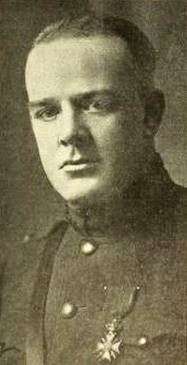Robert Kane (producer)
Robert Kane (1886 – 1957) was an American film producer. He is sometimes credited as Robert T. Kane.
Robert Kane | |
|---|---|
 Kane in wearing a European Expeditionary Force uniform and his Belgium Croix de guerre | |
| Born | September 15, 1886 |
| Died | January 5, 1957 Honolulu, Hawaii United States |
| Other names | Robert T. Kane |
| Occupation | Producer |
| Years active | 1925-1948 |
Biography
During the 1920s Kane oversaw the Astoria Studios for Paramount Pictures, the company's base on the East Coast. In 1930 Paramount put Kane in charge of the Joinville Studios in Paris where the company made multiple-language versions in various different languages.[1] The move was a response to the introduction of sound film which meant English-language films made in Hollywood were no longer suitable for non-English-speaking markets. Joinville produced hundreds of films in a two-year period, before dubbing became more widespread.
In the late 1930s Kane was involved with 20th Century Fox's British subsidiary which made expensive productions rather than the quota quickies that had been made there by American companies earlier in the decade. In 1937 he produced Wings of the Morning, the first technicolor film to be made in the British Isles. He returned to the United States following the outbreak of the Second World War, where he worked on the bullfighting drama Blood and Sand starring Tyrone Power.
Selected filmography
- The Wilderness Woman (1927)
- Broadway Nights (1927)
- French Dressing (1927)
- Aces of the Turf (1932)
- Orchids to You (1935)
- Dressed to Thrill (1935)
- Keep Smiling (1937)
- Under the Red Robe (1937)
- Wings of the Morning (1937)
- Dinner at the Ritz (1937)
- So This Is London (1939)
- Inspector Hornleigh (1939)
- Shipyard Sally (1939)
- Blood and Sand (1941)
- A Very Young Lady (1941)
- The Sullivans (1944)
- Canon City (1948)
- He Walked by Night (1948)
References
- Jarvinen p.45
Bibliography
- Jarvinen, Lisa. The Rise of Spanish-Language Filmmaking: Out from Hollywood's Shadow, 1929-1939. Rutger's University Press, 2012.